Search results
159 results found.
159 results found.
So in-between blogging, researching, and teaching, I do have a private life. The main part of that life is my two children. I have mentioned them every now and then here on the blog, like when they were born: Selma in 2011 & Ellen in 2014, and in a post on our racialized lives “You are yellow and I am brown” and in a post on how to carry a baby Ghana style (one of my few videos).
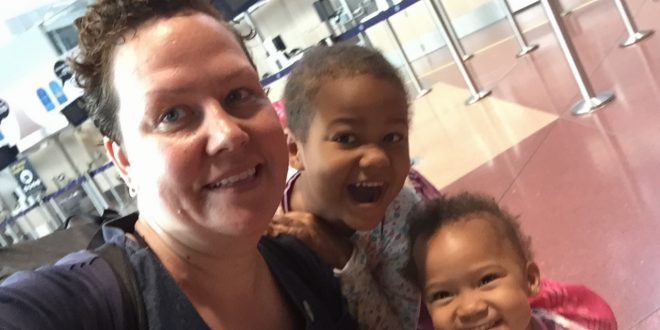
However, I would like to write a little more here on the blog about my children, things we do together, and challenges we face as a family. I will do so under the category: Parenting.
While some might feel one should not “expose” children online, I see my online life as a part of my life and it feels strange to “hide” them away from my blog. Also as my children grow and frankly become more fun to hang out with, I think I have more to say about them, their activities, and about life with children more generally. I am mindful of that they are their own people who should get to tell their own story, but until they start their own blogs (oh, what a dizzying thought!), I think I can say quite a bit more without compromising their integrity.
If you have ideas on topics you’d like to read relating to life with children, do leave a comment!
On Tuesday, I went to the tech fair Mobex16 in the Accra International Conference Center. I had only planned to swiftly stop by, but ended up staying all morning. Networking was great!
However, this blogpost is on some other observations I made in relation to Mobex16. I came with my phone, ready to tweet, and laughingly told a friend that I have been here for 8 min and already posted 3 tweets. I was on fire!
I tweeted about the registration and started taking photos for Instagram. I am a promoter of all things Ghana, especially tech stuff, and I was happy to share the experience with my now 9000+ followers on Twitter and 600+ followers on Instagram.
Just arrived at #mobex16. pic.twitter.com/PV26nFJIlQ
— Kajsa Hallberg Adu (@kajsaha) June 7, 2016
Registration #mobex16 as of now is 5 min. Sign up online to make the process faster!https://t.co/qQ6evAOuH1 pic.twitter.com/cnYZ3gfYqo
— Kajsa Hallberg Adu (@kajsaha) June 7, 2016
Selfie-time #mobex16 @edemrobby @attigs @fiifibaidoo pic.twitter.com/yQ1MyY2L8v
— Kajsa Hallberg Adu (@kajsaha) June 7, 2016
At this stage, I needed to charge my computer (as I really had plans of working out of an office) and with heavy tweeting during the opening and the president’s speech, my phone as well. Now there were no electrical sockets in the seminar room. I looked around and asked an usher. I tweeted about that.
Ironically no sockets for visitors #mobex16 – reminding us all that there is no digital economy without electricity! #233moments
— Kajsa Hallberg Adu (@kajsaha) June 7, 2016
After realising that no woman was to appear on the stage for the first two programs on the agenda or the entirety of my morning visit – the info I took from a information that was passed out to visitors, I tweeted about that.
Not a single woman on stage for the opening of #mobex16. None in the ensuing panel as well. Not cool, @mobexafrica. pic.twitter.com/1SzrpwVSSy
— Kajsa Hallberg Adu (@kajsaha) June 7, 2016
Revisiting my Twitter timeline, I was likely inspired by Omojuwa (recently named Africa’s best Twitter profile) and his tweet on female leadership:
There is a shortage of women in governance and public service. The earlier this is corrected the better for us as a country.
— JJ. Omojuwa (@Omojuwa) June 7, 2016
After I had left the seminar hall in search for power, I browsed the exhibit. Noticing that many Mobex16 stands did not really have a plan to engage with social media influencers, I talked to some exhibitors and tweeted about that.
Is your company social media marketing savvy at #mobex16 ? @PisenGhana were happy to see me and gave me this gift. pic.twitter.com/Yg4Gg9XkDi
— Kajsa Hallberg Adu (@kajsaha) June 7, 2016
You get my drift, I was engaging with the program, capturing both highlights and lowlights. Tweeting and Instagramming. Now some did not like that:
@kajsaha if #mobex16 scored 100%, then angels organised it. What’s your score for mobex?
— Ing. Clement Amole (@AmoleIng) June 8, 2016
Ironically I personally asked to help @kajsaha upon entry and she said, she didn’t need any help..hmm @mobexafrica https://t.co/JFOE98wyZS
— Alain Gbeasor (@alaingbeasor) June 8, 2016
@tailorMARIQUE Kajsa, you left the venue soon as the president left and didn’t sit through any of the sessions@newYorkcharlie @kajsaha
— #MallamsAndPastors (@EkOwMaIsSe) June 7, 2016
…and my personal favorite:
@kajsaha Why won’t you just appreciate everything.
I’m reviewing the #mobex16 and all I’m see is you criticizing everywhere.
Cmon— ?R (@Ryan_KmO) June 7, 2016
I get it, I have been an event organiser and its not necessarily fun to hear about someone’s negative experience when you have been working 24/7 to even make the thing happen, but I do listen and think to myself “how can I improve?” I also try to be mindful of that whoever takes the time to write to complain, cares a whole lot more than the people that just “come to eat”. (Caveat: I am not sure what the relationship between the people behind the sour tweets above is to the event discussed).
A few months back, Poetra Asantewa in an AccraWeDey-podcast said some very useful things about critique and how there is little room for it in the Ghanaian creative space. We just need to change that, so in the name of constructive critique, I’ll list some ideas for even better social media engagement for Ghanaian events below.
Tips for event organisers how to better engage with social media influencers:
Something like this:
Regina Honu is supposed to be on the next panel please https://t.co/uylJHPJNEo
— #MOBEX16|June7-9|ACC (@mobexafrica) June 7, 2016
What would you add to the list?
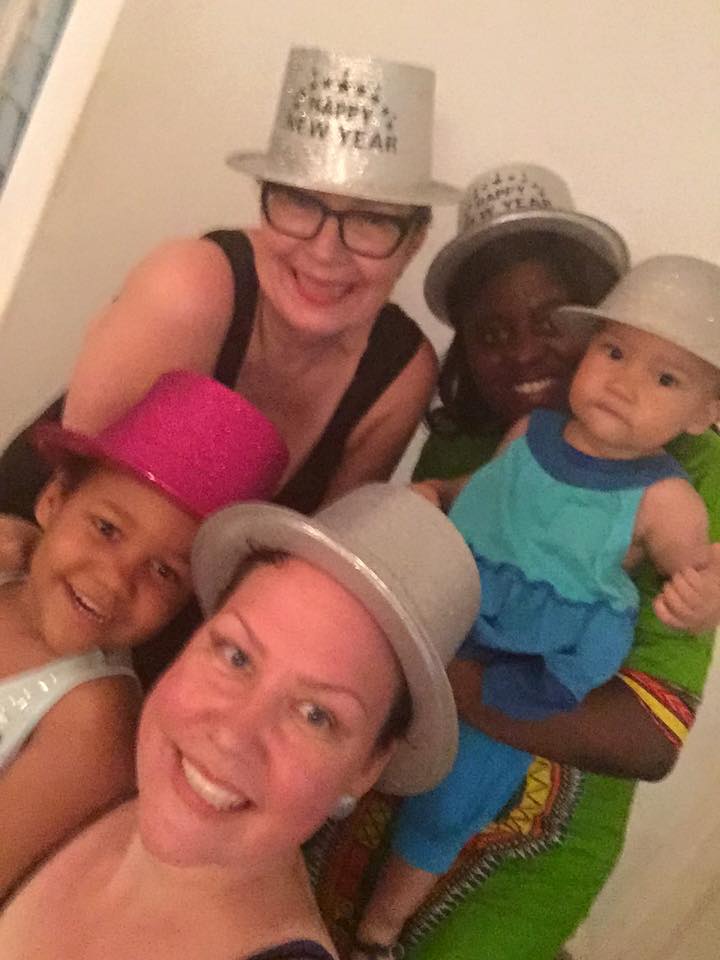
Summary of my blogging year:
My blogging year started out with a resolution: to finish my Phd. How that went, you can see in the blog a created solely for my doctorate: Student Migration Aspirations. In February, dumsor got worse, the following month, I thought about the tech community in Ghana and started a nice convo about what is wrong with it. In April, I shared the top 7 tips on how to sleep during light off, in May I went to BlogCamp, Ghana Blogging and Social Media Awards and the #DumsorMustStop vigil, in June I didn’t write one single post (but thousands of words on my dissertation, in July, I submitted it!). August was spent in Sweden on vacations. In September, I was back with a life-(and blog-)crisis! In October, I decided to write more personal stuff here. Thanks for the positive feedback, especially to the first post on how much one should have in common with a spouse. The world changed with refugees flowing into Europe and Zone9 bloggers being freed in Ethiopia. Towards the end of the year, I introduced the Sunday Reads and increased my posts on politics and personal issues.
While the year started slow, I must say with dumsor and research slowing me down, I am happy the way I managed to find my passion for blogging again.
Did you read these three highlights?
1. Most read post:
The Power of Social Media – the case of Nana Aba Anamoah of TV 3
“My view on this is that this is a historical moment for social media in Ghana. This sector has been seen as not “real”, something that happens outside of work. Hence most media personalities in Ghana have their own personal accounts, powered by their appearance on a legacy media channel, but run solely by themselves without any support, training, equipment, as well as away from attention from their employers.”
2. Most underestimated post:
“How does one cope on a personal level with all of this?
I have to say: I don’t know. I think do not cope very well! I get so angry and disturbed I cannot focus on much else on many days. I tweet, blog, and rant. I make plans to leave, I take deep breaths, and I laugh about it all. I try to balance the impressions.”
3. Most fun post:
“This Xmas season, Ghanaians have again used humor to deal with life situations. Under the hashtag #NDCcarols where NDC of course stands for the ruling party National Democratic Congress, Ghanaians have written their own renditions of famous christmas carols.”
Thank you for reading my blog. Happy new year all readers, please continue to follow me in this space – and if you want a reminder when a new post is out – follow me on Facebook or Networked Blogs in 2016!
I am not sure how it started, but it feels like I have always had a love for numerology or finding meaning in numbers. For instance, it makes me happy to see the time is 12.34 (AM or PM does not matter).
Further, I feel good about facts like:
In Ghana, as most of readers of this blog will know, the weekday of which you were born is important and many Ghanaians have a first name relating to it. This also gives rise to beautiful parallels:
A problem with this love of parallelism, is when it does not occur and the deep discomfort it brings. For instance, when we were getting married, the date 29th March, 2008 was decided on for a number of practical reasons. Twenty-nine-zero-three-two-thousand-and-eight. It was so random. So non-special. It had no parallelism. I just did not “feel” the date! Almost considering rescheduling for a “better” date, suddenly my mother-in-law pulled me aside. She told me that the 29th of March, 1967 was the day of her first date together with my husband’s father! The parallelism had been found! I never reconsidered the date again.
When our second child was born on the SAME DATE as our first born, as an avid numerologist I was ecstatic! The birthday, is also a beautiful number as the 21st of the 7th month! It is hard to explain, but in my numerology brain that makes it feel like it was somehow meant to be. On top, the water broke at 2.33 in the morning, I’m not joking, the quintessential #233moment (hashtag created by Ato Ulzen-Appiah for all things Ghana). Our second child’s birth was almost on the hour exactly three years later from the first. On top, my first born is born 30 years after I was born, and my second born, 30 years after my younger and closest sister.
Maybe it is a human thing, this looking for meaning and symmetry in a chaotic world. While I enjoy numbers looking neat and organised around me, at the same time, I can of course see that so many other things were not beautiful, numerical coincidences, but have worked out anyways. I do not officially subscribe to any numerology faith, I am definitely an atheist. But coincidences, numbers and parallelism do have an impact on my emotions.
Recently, I realized I have never really discussed this with anyone. Do you think the same way? Or do I seem mad to you?
This post is part of my new series of more personal posts to be posted on Fridays, Personal Friday.

The eery Ebola virus is again on the lose in West Africa. After having spread quickly in Guinea and then jumped boarders to Liberia and Sierra Leone, least week it got to Mali and today we have heard reports about a young woman in Kumasi in Ghana having suspicious symptoms…For a virus with an up to 90% mortality rate, we must educate ourselves. Here is what I found:
1. Ebola is not an airborne virus. Do not panic, sitting on a bus will not make you sick!
2. Ebola transfers to humans in two ways: from being in contact with/eating an infected animal (most often fruit bat or monkey) or from being in contact with body fluids (blood, saliva, semen, urine, stool…all of them) from other infected human beings, alive or dead. Health workers or family members of infected people are most at risk.
3. Ebola has an incubation period of 2-21 days but no known vaccine or cure.
4. Initial symptoms of Ebola are similar to malaria with fever and general fatigue, but can also cause internal and external bleeding.
5. World Health Organization (WHO) does not recommend any travel or trade bans because of the Ebola outbreak.
Read more on Ghana Health Nest or Centre for Disease Control (CDC) or this interesting article on what made the Guinea outbreak of Ebola unusual. So far no information on Ghana Health Service or Presidency Ghana.
Photo borrowed from BBC/AFP.
UPDATE: Tests show the deceased did not carry the Ebola virus, reports AP.
By way of reading my BloggingGhana colleague Sandister Tei’s blog, I came across artist Herbert Baglione’s blog. Although this man is Brazilian, he had posted a string of black and white photos from Colombia that reminded me so much about Ghana.
This billboard advertising a religious website/ call center reminds me of the many religious billboards in Ghana.
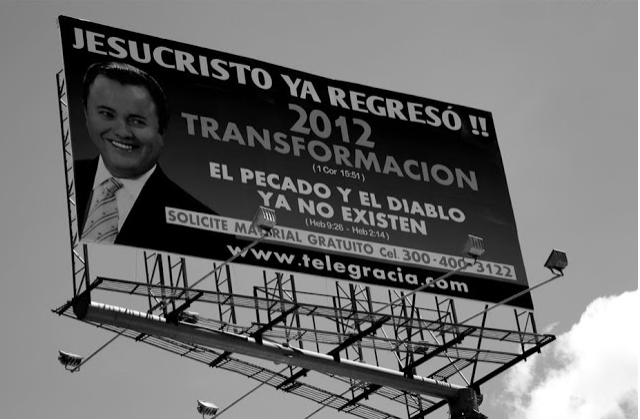
Is it the black and white that makes photos so universal and timeless? Is it my secret desire to go to Colombia shining through? Or does Ghana and Colombia really have much in common?
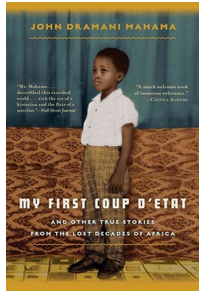 Ghana’s president John Dramani Mahama is the first Ghanaian president to be born in Ghana – his predecessors were all born in the colony of Gold Coast. This fact was many times commented on in the 2012 elections and maybe it was an advantage to his main opponent who, 20 years his elder, belonged to the group born in the Gold Coast. What makes Ghana’s current president even more unique is he is the only Ghanaian President to have written an autobiography before entering the office.
Ghana’s president John Dramani Mahama is the first Ghanaian president to be born in Ghana – his predecessors were all born in the colony of Gold Coast. This fact was many times commented on in the 2012 elections and maybe it was an advantage to his main opponent who, 20 years his elder, belonged to the group born in the Gold Coast. What makes Ghana’s current president even more unique is he is the only Ghanaian President to have written an autobiography before entering the office.
I read it last year as prep for my election involvement. I was surprised at how well the book worked as literature. I was surprised to understand that Mahama who has an air about him to be “an ordinary man”, in fact is a descendant of kings on both sides of his family.
I felt the book expertly walks us through how someone finds themselves politically, discovers their ideology and therefore I decided to use it as a required reading for my Social Theory class. Reading a book with a group of 120 others, makes it even more come alive and also other qualities are discovered.
For instance, many of the students liked how he wrote about music and what it meant to him as a young man. Others found side stories interesting such as how he dealt with bully Ezra, the friendship with his teacher and his strange welcome into the Soviet Union as formative moments, possibly shaping his political thoughts.
There were also some surprising voids, for instance his romantic relationships were reduced to a cute story about a young Mahama falling in love with a 12 year old neighbor. What about his wife Lordina and possibly other women? What his personal relationship to Flight lieutenant Rawlings, now an elder in Mahama’s party, who led the nation in difficult years of starvation and lack of freedoms in the beginning of the 1980s and Mahama’s father was forced to leave the country?
Reviews have over all been positive. See for instance the extensive review in WSJ:
Mr. Mahama is at his best in describing this vanished world. He does so with the eye of a historian and the flair of a novelist. “My First Coup d’Etat” is a collection of personal reminiscences centered on the traditional customs of his home village, where every older man is respectfully called a grandfather and every woman a grandmother.
and blogging colleague Nana Fredua-Agyemang:
There is some ambiguity in Mahama’s (the author’s) life as described in the book. On one hand his home was better than the average Ghanaian – thus, one could – in the context of Ghana – say that he was a privileged child, regardless of the ups and downs that came with it. However, his individual life – isolated from that of the family, was average.
In this video, J. D. Mahama reads from the book.
Frankly, I am surprised this book has not been made more readily available in Ghana (for instance through a local publisher) as it is an important, well written book that lets us understand our current president a bit better; where he – and the country – is coming from.
So, a Swedish friend of mine wrote an article about how politicians can learn from hipsters. For those of you who do not read Swedish, his argument was basically that even though hipsters might look silly and obsess over city farms, homemade bread and vintage clothing – they offer insights into sustainable living of the future. As I complimented hom on the interesting frame (learning from hipsters), he responded with a question: How is it with hipsters in Ghana?
Well, let’s back track and fist find a definition for hipsters. Urban Dictionary thinks it is:
|
a subculture of men and women typically in their 20’s and 30’s that value independent thinking, counter-culture, progressive politics, an appreciation of art and indie-rock, creativity, intelligence, and witty banter.
|
So, are there hipsters in Ghana?
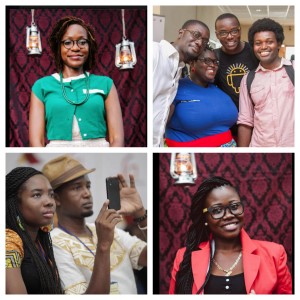
I guess that depends on who you ask. Candance (who recently moved to Ghana from the US) for instance recently commented that on Instagram that she was at a Ghanaian farmers’ market with NO HIPSTERS!
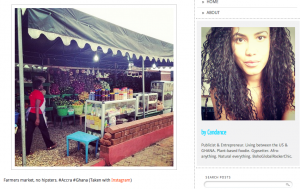
But that might just have been due to language. That market likely wasn’t called a “farmers’ market”. And how will then hipsters know it’s a place for them?
But when used clothes are called “Vintage” as well as when social media is discussed, hipsters do show up, also in Ghana. The indie scene in Ghana, in my humble opinion, is flourishing with TEDx events (read about TEDxOsu here from just this past weekend), AccraDotAlt’s TalkPartis (and check out these great hipster photos!) and Jungle Music Festival Asabaako where the Ghanaian hipster community discuss art, listen to local DJs play indie music and eat local foods. However, the best place to spot hipsters in Accra is at The Republic Bar, where local spirits blended into great cocktails meet nostalgic decor. Does it get more hipsterish?
Yes, the hipster scene in Ghana might be small, foreign inspired and sometimes elitist, but I think – just like my Swedish friend – we can learn a thing or two from hipsters and their obsessions (for instance The Republic Bar manages to have the best AND cheapest cocktails in town as they use local ingredients).
What did I forget about the hipster scene in Ghana? I will gather your comments and write a follow up post as soon as my homemade bread has risen.
Photo collage trying to prove my point with photos from Facebook groups for Vintage Gh and BloggingGhana.
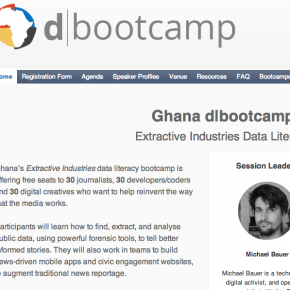 This weekend is Memorial Day (US), Mother’s Day (Sweden, Hurray for mom!) and African Union weekend (Africa). But how does one celebrate the African Union? I am not sure, but will spend the delayed holiday (in Ghana holidays that fall on weekends get “compensated” at the first possible weekday, in this case AU Day fell on Saturday 25 May, hence tomorrow, Monday 27th is the day off!) and two more days at a data bootcamp vamping up my data mining skills, maybe they can be beneficial for the continent?
This weekend is Memorial Day (US), Mother’s Day (Sweden, Hurray for mom!) and African Union weekend (Africa). But how does one celebrate the African Union? I am not sure, but will spend the delayed holiday (in Ghana holidays that fall on weekends get “compensated” at the first possible weekday, in this case AU Day fell on Saturday 25 May, hence tomorrow, Monday 27th is the day off!) and two more days at a data bootcamp vamping up my data mining skills, maybe they can be beneficial for the continent?
Normally, I stay away from everything bootcampey as endurance is not my strongest side, I rather like to digest information slowly over time, but I have made this exception as I am very much interested in how data can become news and more people can get access to knowledge. Or is the words of the organizers:
“to boost analytical, evidence-based reportage by giving journalists the digital tools, access to data, and computational skills necessary for transforming the way that newsrooms function.”
We will learn how to “mine” and “scrape” data, how to build apps and websites to visualize the data and how to “pitch” ideas as to get funding. Teachers are a list of interesting people from techie/journalist Justin Arenstein that I have earlier met at a Google event to the Worldbank statistician Lynne Henderson and many more interesting folks.
I am excited about tomorrow and should probably hop to bed. Already, I have some ideas for apps that might not necessarily conform with the “extractive sector” that is a focus of this workshop and a hanging question: where does academia come into all of this?
Behind this data bootcamp is the African Media Initiative, the World Bank Institute, Google Africa and theOpen Institute. Thank you!
A wonderful initiative by Creative Storm is the Maternal Health Channel on GTV on Thursdays at 8PM and on TV3 on Fridays at 8.30 PM. The program sheds light on maternal health in Ghana, or rather the lack of it.
The series started with the story of Charity, a woman who did not survive giving birth.
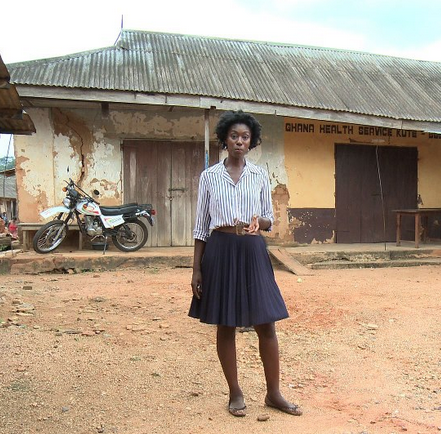
MHC write on their very active Facebook page:
“Every maternal death is an intensely personal tragedy and it is essential to hear the stories of those who have suffered in order to illuminate an issue that is both immediate and far more complex than it seems on the surface.
We can change; Ghana can achieve Millennium Development Goal #5, the reduction of maternal mortality by 75% in the year 2015. The first step is EVERYONE having a discussion about an epidemic that is far too often overlooked. The first step is with YOU.”
As a mother and a daughter and a citizen of the world, it angers me terribly that women should have to give up their life when giving life. We know it takes 9 months, we know you need vitamins and clean water, we know giving birth is a risk and a hard job, we know how to create the best possible chances for both mother and baby to survive – still women are dying for no good reason at all.
This week, they go to Kute Buem in the Volta region, see pic.
Personally, I think The Maternal Health Channel is one of the most important media initiatives in Ghana I have ever seen. It is massive, well thought out and quite digital (facebook, vimeo, tumblr, on Twitter use hashtag #mhcghana). If you agree with my sentiments or, better yet, with their mission to save more mothers and babies in Ghana, please spread this information to your networks, discuss online, blog on it and watch the program!
I have written on this topic before Why Are Mothers Still Dying? and When I Donated Blood and Ganyobinaa also wrote about MHC.
Hurray! Yesterday, the Dalberg report (click here for PDF) was released to describe the impact of the Internet in some African countries, including Ghana. This is the type of report that a blogger needs when asked “…but really, can the Internet have an impact in Ghana?”
The report openly target policy makers in Ghana ( Kenya, Senegal and Nigeria) and focuses on “potential” and findings such as “more than 80% of SME owners expect that the Internet will help them grow their business, and 70% of those expect to hire new employees as a result.”(p.7) It also comprehensively compares the countries with a model that takes into consideration “core” (from infrastructure to business environment and school enrolment rates) and “conditions for usage” (from percentage of households with electricity to mobile and broadband subscriptions to uploads of video!). Here we can see that over the past six years, Ghana significantly improved the “core”, but not the “conditions for usage”. They recommend government to play a role.
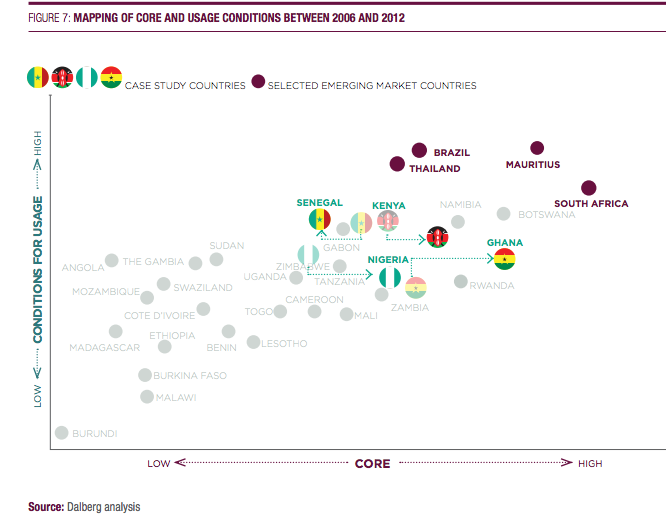
My understanding of this, but detailed data could tell if I am right, is that although we have the core or the basics in place, for some reason the conditions for usage and hence reach does not follow. It is still expensive to access Internet in Ghana and despite competition bordering on overcrowding, data is not becoming cheaper.
Here are 5 other findings from the report I thought were interesting and my corresponding comments:
1. Ghana Rocks Social Media
“[Ghana] shows comparatively high engagement in social media, content generation on Wikipedia and video sharing. These build atop its leading position in mobile broadband penetration on the continent, relieving barriers to higher bandwidth interaction. Despite this strong performance, our analysis suggests that Ghana now needs to focus its attention on improving the level of attractiveness of Internet services” (p.11)
We often complain about access, but comparatively (with other African developing countries), we are doing fine. Also, I am happy to read that content creation, as recently discussed at BlogCamp13 is relatively good. Although mobile broadband is fine, it is still expensive especially for data intensive operations such as uploading video.
2. The promise of social media for government and citizens
“Social media and social networking is proving to be a catalyst in driving Internet access and impact….Social networks can create stronger links between government, educators, service providers, businesses and citizens. Users are already engaging on topics including music, dating and sport, but these networks are also quickly expanding to include education, health information and governance, and will undoubtedly influence how users engage in more sophisticated Internet
use over time.” (p.3)
This point cannot be overstated and it is A GOLDEN OPPORTUNITY for Ghana and other countries in Africa with traditionally not very cosy relations between citizen and state.
3. Wider Access Completely Changes the Game
“Internet penetration also opens up entirely new business models for both companies with technical expertise as well as entrepreneurs. In Nigeria, for example, it has created opportunities for software designers developing gaming applications and mobile traffic applications, such as Maliyo Games, Gidi Traffic and Road Peer. It has also created opportunities for traditional and new media companies via advertising revenues, bringing in over 5M Naira a month for bloggers such as BellaNaija and Linda Ikeja, discussion forums like Nairaland, and newspapers such as Vanguard. Vanguard’s print business was unprofitable on its own, but its online portal ranks as the twelfth most popular site in Nigeria, and generates enough advertising revenue to make the entire operation viable.” (p. 17)
In Nigeria, bloggers make a living on what they do. So far in Ghana, there are just a handful bloggers who can , Ameyaw Debrah is the one that springs to mind, and maybe a few others who consult alongside their websites. Still, there seems to be no profitable way of advertising online in Ghana (although I believe a MEST start-up Adsbrook is working on it) . Is it a volume issue? What if Internet reached not only the population it reaches today (18% or 4,1%), but twice as many households?
4. Access is key
What is this report about? I think this word count exercise will tell you in a blink! The word “access” was used 234 times, “mobile” 134 times, “growth” 112 times, “broadband” 42 times, “open data” 24 times, “blog” just 7 times, “political” only 3.
5. What about Political Impact?
Following the exercise above…If to look broadly at “impact” there were some important political initiatives such as Enough is Enough Nigeria and GhanaDecides that were not mentioned. I suspect that is because these were not initiatives that made economic impact (not directly at least), but rather focused on governance. But as we all know, they are interlinked! A chapter on political impacts of Internet (and political potential) including transparency, accountability and governance would have added that which, according to the Dalberg report:
“available studies typically lack detailed analyses of the social and political value of the Internet, especially across Sub-Saharan Africa.”
That is, if you want to call a report “impacts of the Internet”, include all major impacts. Else, “economic impacts” might be a better title.
All in all, this is an amazing report that I will be referring to for a long time. I only wish details of the computation leading up to the table posted above would be shared, maybe on the companion website for the report? Thanks to Google Africa for sponsoring (commisioning?) this useful report.
Other places for Internet information concerning Ghana are: Afrinnovator’s Ghana Page, History of Internet in Ghana from GhanaWeb (not well written, but an interesting reminder) and another historic reminder from Colunmbia University (from 2005?) Internet World Stats (last figures from 2009), Internet Governance Forum Ghana and Research ICT Africa.
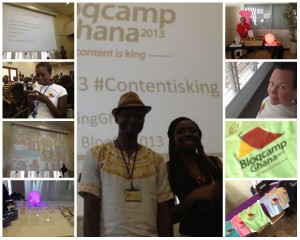 Saturday 23 March 2013, Ghana’s second blogcamp or conference for bloggers took place. In the evening Ghana’s forst Social MEdia awards were held at the same venue. It was amazing and two days later, I am still tired and slightly overwhelmed.
Saturday 23 March 2013, Ghana’s second blogcamp or conference for bloggers took place. In the evening Ghana’s forst Social MEdia awards were held at the same venue. It was amazing and two days later, I am still tired and slightly overwhelmed.
I will not tell you about everything that happened (Kinna did that already very well), neither will I talk about my trip to the venue (far less interesting than Kofi Larbi’s), but just offer some thoughts – as one of the cofounders of BloggingGhana – the organizing body behind the event:
1. Do we really have 400 people plus in Ghana interested in blogging to the point they spend a whole day, and transport costs, learning more? Amazing!
2. BloggingGhana has been about friendships since the very beginning. I have made some of my most important friendships in this group and what made me happy on Saturday was that new friends seemed to be all around. Many people also met their Twitter or Blog friends in person for the first time. I had some experiences like that as well! Kinna wrote:
I wasn’t privy to any such conversation, but I’m sure there were all manners of hooking up going on! Lots of smiling, lots of hugs, some shade and a world of happiness!
That was indeed the feeling!
3. I wasn’t expecting feeling moved by that the US ambassador came by, but his speech contextualized BloggingGhana in ways I haven’t fully before realized. Hearing things like this constituted an aha-moment for me (click on link above for the whole speech):
We applaud Blogging Ghana for its efforts to encourage hundreds of Ghanaians to express themselves on a broad array of topics affecting daily life. …We support events such as this because we know that honing communication and information technology skills will directly be transferable to the expansion of business opportunities between the U.S. and Ghana, one of our highest priorities. We agree with the visionaries who founded Blogging Ghana: In the next five years more and more people are going to find employment utilizing their social media expertise.
4. The glamour of the Social Media awards were also surprising (I should have changed my clothes!) and can be credited to aforementioned diplomat, our own Nana Darkoa of Adventures from winning the Best Blog category and the organizers of the award, Fred and Golda for their attention to detail, for instance to the beautiful physical awards! (bottom left in the collage above)
5. We have already started to plan #BlogCamp14! We started around lunch time on Saturday! It will be better, bigger and more intense. We will also think of a way of making the event more sustainable, likely by roping in some of the attendees as contributing members of our organization. Watch out!
Trust me, I have so much more to say about this day and all the people I met/highfived/laughed with/gave my contacts to/directed to the right session, but talking to so many people, both in mics and face to face is tiring. I still feel exhausted. Thankful. Overwhelmed.
And Inspired.